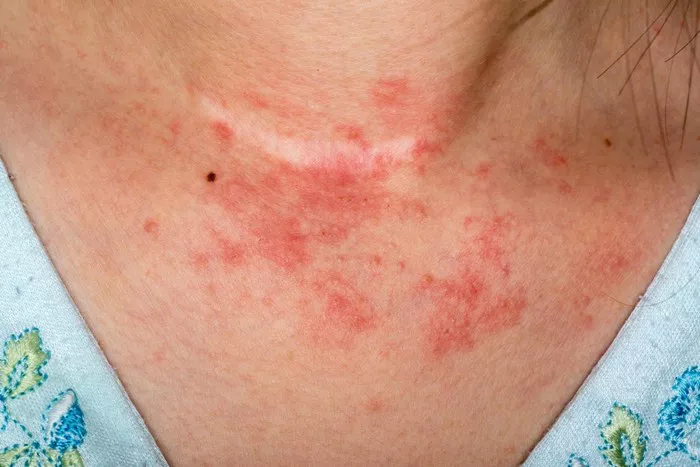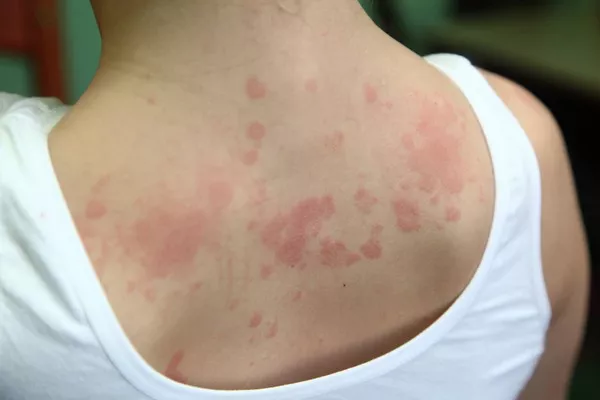Eczema is a common skin condition affecting millions of individuals worldwide. It is characterized by inflammation, itchiness, and redness, often leading to discomfort and distress. Eczema encompasses various types, including atopic dermatitis, contact dermatitis, and dyshidrotic eczema, each presenting with its own set of symptoms and triggers.
Atopic dermatitis, the most prevalent form of eczema, typically manifests in childhood and is often associated with a family history of allergic conditions. Contact dermatitis, on the other hand, results from direct contact with irritants or allergens, triggering an inflammatory response in the skin. Dyshidrotic eczema primarily affects the hands and feet, leading to the formation of small blisters and intense itching.
The hallmark symptoms of eczema include dryness, itchiness, redness, and inflammation. In severe cases, the skin may become cracked, blistered, and prone to infection. These symptoms can significantly impact an individual’s quality of life, affecting sleep, mood, and overall well-being.
Consulting a dermatologist is essential for an accurate diagnosis and personalized treatment plan. Dermatologists utilize their expertise to identify triggers, prescribe appropriate medications, and provide guidance on skincare routines tailored to each patient’s needs.
Over-the-Counter Treatment Options
Over-the-counter (OTC) treatments play a crucial role in managing eczema symptoms, offering relief from itchiness, inflammation, and dryness. These treatments are readily accessible and can be incorporated into daily skincare routines. Here are some common OTC options:
1. Emollients/Moisturizers:
Emollients, also known as moisturizers, are fundamental in eczema management. They work by hydrating the skin and restoring its natural barrier function, thereby reducing dryness and preventing moisture loss. Emollients are available in various formulations, including creams, lotions, and ointments, catering to different preferences and skin types.
Popular emollient brands include CeraVe, Cetaphil, Eucerin, Aveeno, and Vanicream. These products are formulated with gentle ingredients suitable for sensitive skin, making them suitable choices for individuals with eczema.
2. Topical Steroids:
Topical steroids are anti-inflammatory medications that help alleviate itching, redness, and swelling associated with eczema flare-ups. They work by suppressing the immune response in the skin, thereby reducing inflammation and promoting healing.
Hydrocortisone cream, available in varying strengths (e.g., 1%, 2.5%), is one of the most commonly used topical steroids for mild to moderate eczema. It is applied directly to the affected areas and should be used sparingly and under the guidance of a healthcare professional.
Clotrimazole cream is another OTC option that may be used to treat eczema, particularly if fungal infection is suspected. It has antifungal properties and can help alleviate symptoms such as itching and redness.
3. Antihistamines:
Antihistamines are medications commonly used to relieve itching associated with eczema, particularly during nighttime when symptoms may worsen. They work by blocking the action of histamine, a chemical released by the body in response to allergens or irritants.
Popular antihistamine brands include Benadryl (diphenhydramine), Zyrtec (cetirizine), and Claritin (loratadine). These medications are available in various formulations, including tablets, capsules, and liquid suspensions, catering to different age groups and preferences.
4. Other OTC Products:
In addition to emollients, topical steroids, and antihistamines, several other OTC products may provide relief from eczema symptoms:
- Calamine lotion: Calamine lotion has soothing properties and can help alleviate itching and irritation associated with eczema. It contains ingredients such as zinc oxide and iron oxide, which have mild antipruritic and astringent effects.
- Oatmeal baths: Oatmeal baths are a popular home remedy for eczema, known for their ability to soothe itchy and inflamed skin. Colloidal oatmeal, finely ground oatmeal suspended in water, forms a protective barrier on the skin, reducing moisture loss and relieving irritation.
- Coal tar products: Coal tar products, such as coal tar shampoo and coal tar ointment, are commonly used to treat eczema, particularly scalp eczema and psoriasis. Coal tar has antipruritic and anti-inflammatory properties, making it effective in reducing itching, scaling, and inflammation associated with these conditions.
Choosing the Right Treatment
Selecting the right OTC treatment for eczema depends on various factors, including the type and severity of the condition, the individual’s age, skin sensitivity, and personal preferences. Here are some considerations to keep in mind:
1. Type and Severity of Eczema: Different OTC products may be more effective for certain types and severities of eczema. For example, mild cases of eczema may respond well to emollients and low-potency topical steroids, while more severe cases may require stronger medications or combination therapies.
2. Age of the Individual: Some OTC products may not be suitable for infants or young children, as their skin may be more sensitive and prone to adverse reactions. It’s essential to choose age-appropriate treatments and consult a pediatrician or dermatologist if unsure.
3. Skin Sensitivity: Individuals with sensitive skin or a history of allergic reactions should opt for fragrance-free, hypoallergenic products to minimize the risk of irritation. Patch testing may be recommended to identify potential allergens or irritants.
4. Personal Preference: Consider the formulation and texture of the product, as well as ease of application and absorption. Some individuals may prefer lighter, non-greasy formulations, while others may find ointments or thicker creams more hydrating and soothing.
Additional Tips for Managing Eczema
In addition to OTC treatments, implementing lifestyle modifications and skincare practices can help manage eczema symptoms and prevent flare-ups. Here are some additional tips:
1. Trigger Avoidance: Identify and avoid common triggers that exacerbate eczema symptoms, such as harsh soaps, fragranced products, wool clothing, and environmental allergens like pollen and dust mites. Opt for gentle, fragrance-free skincare products and detergents formulated for sensitive skin.
2. Bathing and Moisturizing Routine: Establish a regular bathing and moisturizing routine to keep the skin hydrated and protected. Use lukewarm water and mild, fragrance-free cleansers to avoid stripping the skin of its natural oils. Pat the skin dry gently with a soft towel and apply moisturizer immediately to lock in moisture.
3. Stress Management: Stress can exacerbate eczema symptoms and trigger flare-ups. Practice stress-reduction techniques such as deep breathing, meditation, yoga, or tai chi to promote relaxation and emotional well-being. Engage in activities that bring joy and fulfillment, and prioritize self-care.
4. Dietary Modifications: Some individuals may find that certain foods exacerbate their eczema symptoms. Keep a food diary to track potential triggers and consider eliminating or reducing common allergens such as dairy, gluten, and nuts. Consult a healthcare professional or registered dietitian for personalized dietary advice.
When to See a Doctor
While OTC treatments can provide relief for many individuals with eczema, there are instances where professional medical evaluation and intervention are necessary. Seek medical attention if:
1. Symptoms Persist or Worsen: If eczema symptoms persist despite OTC treatment or worsen over time, consult a dermatologist for further evaluation and management. Persistent itching, redness, and inflammation may indicate an underlying skin condition or secondary infection requiring medical attention.
2. Signs of Infection: Watch for signs of bacterial, viral, or fungal infection, such as increased redness, swelling, warmth, oozing, or pus-filled lesions. Prompt treatment with antibiotics, antivirals, or antifungals may be necessary to prevent complications and promote healing.
3. Severe or Widespread Eczema: If eczema affects large areas of the body or significantly impairs daily functioning and quality of life, seek medical evaluation from a dermatologist or allergist. Severe eczema may require prescription medications, phototherapy, or biologic agents to achieve optimal control.
4. Impact on Quality of Life: Eczema can have a profound impact on emotional well-being, sleep quality, and overall quality of life. If eczema-related distress or anxiety persists despite OTC treatment, consider seeking support from a mental health professional or joining a support group for individuals with eczema.
Conclusion
In conclusion, OTC treatments play a valuable role in managing eczema symptoms and promoting skin health. By choosing the right products, adopting healthy skincare practices, and seeking medical attention when needed, individuals with eczema can achieve relief and improve their quality of life. It’s essential to approach eczema management holistically, addressing both physical and emotional aspects of the condition, to optimize outcomes and enhance well-being.

























